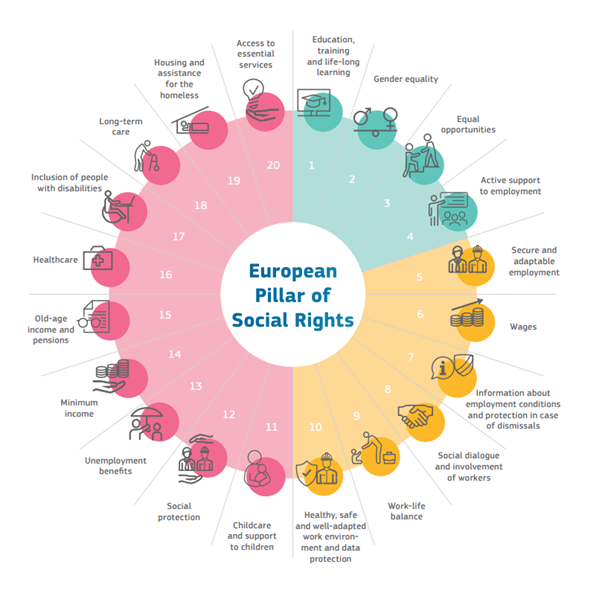
The European Institutions proclaimed the European Pillar of Social Rights in 2017 with a catalogue of 20 social rights to which the European Union committed itself. On March 4th, 2021 the European Commission released its Action Plan to implement these social rights in the European Union. CECOP welcomes that this action plan acknowledges the potential of social economy actors such as worker and social cooperatives in delivering these social rights to European citizens. By providing access to social services, ensuring the inclusion of people in vulnerable positions, delivering quality jobs and bringing value to their communities, worker and social cooperatives in Europe are at the forefront of implementing the European Pillar of Social Rights. CECOP appreciates the acknowledgement of the social economy in the Action Plan as an important strategic partner in its implementation.
Climate change and increasing inequalities made it clear that European societies are in a transition process, for which the European Commission established policies under the European Green Deal. Over the last year, the COVID-19 pandemic had a severe impact on the livelihoods of European citizens and the European Union levied unprecedented resources to respond to this new crisis that reinforces existing inequalities and problems in Europe.
The Action Plan foresees three ‘headline targets’ to be met by 2030: at least 78 % of the population aged 20-64 should be in employment, at least 60 % of all adults should participate in training every year, and the number of persons at risk of poverty or social exclusion should be reduced by 15 million. These headline targets include several sub-targets:
Employment: 78 % of the population aged 20-64 in employment
- At least halve the gender employment gap.
- Increase the provision of formal early childhood education and care.
- Decrease the rate of young people aged 15-29 neither in employment, nor in education or training (NEETs) from 12.6 to 9%.
60 % of adults in annual training
- 80% of those aged 17-74 should have basic digital skills.
- Early school leaving should be reduced and secondary education increased.
15 million less at risk of poverty
- 5 million of which should be children.
These targets are crucial in implementing key elements of the European Pillar of Social Rights. However, it is regretful that the Action Plan does not cover all 20 points of the European Pillar of Social Rights. The European Union and its member states need to take effective steps to address all dimensions of the European Pillar of Social Rights.
To ensure coherence with the commitments made under the Agenda 2030, we welcome that the Action Plan for the European Pillar of Social Rights includes direct links to the Sustainable Development Goals (SDGs). The SDGs have proven to be a comprehensive framework towards sustainable societies, which is the target of all EU policies and this Action Plan is moving towards.
Cooperatives need active policies to implement the European Pillar of Social Rights
Ahead of the publication of the Social Pillar Action Plan, CECOP published a position paper, demanding that the Action Plan addresses 1) job creation and equal opportunities in the workplace, 2) fair working conditions, 3) access to social protection, and 4) support for social economy enterprises such as worker and social cooperatives. The Action Plan addresses these points to varying degrees:
1. Job creation and equal opportunities
Especially considering the COVID crisis, job preservation and job creation are important to allow for social inclusion. However, job creation is not a panacea and not all jobs provide decent work in dignity. The target of 78% of the population aged 20-64 in employment compared to 72.4% in the end of 2020 will require the maintenance and creation of new jobs.
The sub-targets to halve the gender employment gap, the improvement of early childhood education and care, and to bring young people in employment or education are crucial to provide equal opportunities. CECOP therefore welcomes these targets.
Furthermore, the Action Plan reiterates the need of equal opportunity regardless of sex, ethnic or racial origin, disability, religion or belief, age, and sexual orientation. Equal opportunities in the labour market are crucial for social inclusion. Social cooperatives in Europe developed various models to provide opportunities for persons in marginalized situations, such as persons with disabilities and others. In particular, social cooperatives that offer work integration and/or access to services to people with disability play a key role in the social inclusion of their beneficiaries who are often worker members, integrating a governance model that involves many stakeholders: public authorities, healthcare workers, families and clients. CECOP therefore welcomes the recently published EU Strategy for the Rights of Persons with Disability 2021-2030.
The Action Plan highlights the importance of a ‘vibrant industry […] to Europe’s future prosperity and a key source of new jobs.’ The ways to achieve these will be outlined in the European Industrial Strategy and the Circular Economy Action plan. Worker cooperatives are an integral part of Europe’s industry and have repeatedly shown their ability to create and retain high-quality jobs, whilst being resilient in times of crisis. Therefore, worker cooperatives need to be supported in the upcoming update of the EU Industry Strategy. Especially topics such as business transfers to employees under the cooperative form (worker buy-outs) can be utilized to ensure the continuity of enterprises, to maintain jobs and a stable industrial basis. This needs comprehensive support measures and a legal framework within the European Union.
The Action Plan acknowledges the important role of the social economy in job creation while addressing key societal challenges. The upcoming Social Economy Action Plan therefore needs to provide comprehensive support to social economy enterprises, including worker and social cooperatives. CECOP therefore welcomes the roadmap consultation that was conducted in the creation of the Social Economy Action Plan.
2. Fair working conditions
The Action Plan rightly identifies the issue of in-work poverty and inequality as a key challenge to fair work. CECOP welcomes the proposed Directive on Minimum Wages to fight in-work poverty and ensure work in dignity.
A second crucial field of intervention is the blurring lines between employees and self-employed. Especially in the new digital economy, the misclassification of workers as self-employed is a harmful practice, denying workers access to social protection and work in dignity. The recently published social partner consultation on the Platform Work Initiative needs to take ambitious steps to ensure decent work and access to social protection for workers in the platform economy. This also needs to address the issue of algorithmic management and ownership of data.
3. Access to social protection
The Action Plan calls to ensure social inclusion of vulnerable and people in poverty by reducing the number of people in or at risk at poverty by 15 million. This is a crucial step to ensure social protection and inclusion. However, the aim needs to be the eradication of poverty in Europe.
Furthermore, the Action Plan calls for effective access to essential services of sufficient quality. This target is crucial to ensure social protection and inclusion to the most vulnerable. This is a good opportunity to reiterate the important role social cooperatives take in the provision of such services (general interest services, including services for people in marginalized situations). CECOP therefore hopes that the announced report on access to essential services will take account of this work and lead to steps to support social cooperatives in Europe.
The Action Plan foresees the publication of a report on Public Procurement of Innovation and one on Socially Responsible Public Procurement. CECOP welcomes these reports and reiterates that public procurement can be an impactful tool to support social service providers such as social cooperatives, which improves the livelihoods and access to social protection of citizens.
To ensure better access to long-term care, the Commission proposes an Initiative on Long-Term Care to be brought forward. Protecting against the risks of life includes the provision of care to those who need it. Ensuring access to long-term care therefore is a crucial step to fill gaps in social protection.
4. Support for social economy enterprises such as worker and social cooperatives
The Action Plan indicates that the European Commission will provide increasing support to the social economy. Specifically, the InvestEU scheme will allow for increased investment in the social economy, both through financial instruments and grants. Furthermore, steps are planned to increase the visibility of the social economy. CECOP welcomes these steps and urges to pay particular attention to the social innovation brought forward by social economy enterprises such as workers and social cooperatives.
Conclusion
The Action Plan for the European Pillar of Social Rights addresses many of the needs expressed by CECOP ahead of its publication. However, the European Commission needs to uphold its ambitions to deliver on the European Pillar of Social Rights, especially in the implementation of the proposed initiatives. It is regretful that the Action Plan does not cover all aspects of the European Pillar of Social Rights. Therefore, it is even more important to upkeep the ambitions on which the European Commission, the European Parliament and Member States agreed upon in Gothenburg with the ratification of the European Pillar of Social Rights.
In the announced steps taken, the European Commission needs to ensure:
- That worker cooperatives are recognized as an integral part of Europe’s industry in the upcoming update of the Industrial Strategy.
- Provide support and legal frameworks for business transfers to employees under the cooperative form.
- Support for persons in marginalized situations to allow for equal opportunities.
- That worker and social cooperatives are recognized as important part of the Social Economy in the Social Economy Action Plan and supported with dedicated funding.
- A comprehensive regulatory framework on Minimum Wages is developed.
- Meaningful legislative steps are taken to improve the working conditions of platform workers with the Platform Work Initiative.
- That the eradication of poverty is the aim of social policy in Europe.
- Support for social cooperatives as providers of high-quality social services and social inclusion through work.
- Socially responsible procurement promotion among public authorities to raise awareness about existing tools to include social considerations in procurement.
- Funding and support for social innovation by social economy enterprises such as worker and social cooperatives.








 Employment & Social Inclusion
Employment & Social Inclusion  Sustainable Growth
Sustainable Growth 

